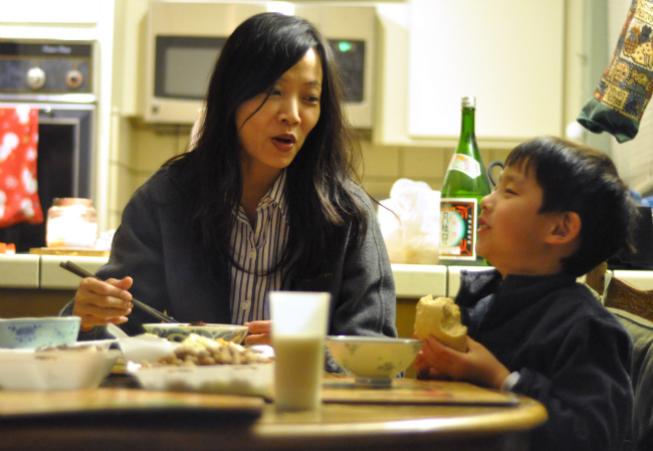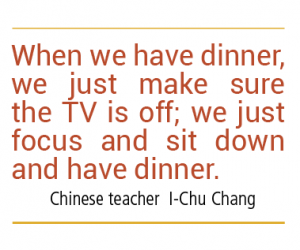
“Today he asked me if he could fly,” said Chinese teacher I-Chu Chang to her husband as she cut up a piece of meat to put on her five-year-old son’s plate.
It’s 6:43 p.m. on a Wednesday night, and Chang, her husband and her son are seated at the dinner table in a candlelit dining room as their dog Nini scampers around their feet. Chang is talking about her son, as she often does during dinner time. But despite the homey ambiance, this meal hasn’t actually been prepared at home.

Dinner culture has changed and evolved over the years, from our perceptions of dinner to how we implement it into our lives. Only 35 percent of MVHS students still eat at the dinner table daily; 12 percent of those surveyed do not eat with their families at all. For the majority of respondents, dinner at the table lasts 30 minutes or fewer.
Chang values dinner with her family, but her busy schedule means that she does not cook her family’s dinners. Because she stays at school everyday until 5:30 p.m., she feels she has little time to cook dinner. To remedy this, she orders Chinese cuisine from home-run catering businesses.
“It’s just too stressful after work … To have to cook [dinner], I think [I’d] be very unhappy,” she said. “I have very little interest in cooking, so I think ordering from somebody else is easier for me. I feel that [it’s] not as stressful, and … I can spend more time with my son in the evening.”
In fact, Chang considers spending time with her son to be one of the most important aspects of dinner time, which usually lasts a little over an hour.
“When we have dinner, we just make sure the TV is off; we just focus and sit down and have dinner,” Chang said. “I like it. So I feel like it’s family time.”
Regardless of her busy schedule, come 6:30 p.m. Chang can always be found sitting at the dinner table with her family, cracking jokes with her husband and asking her son how kindergarten went.
Sophomore Nicole Pinto’s family conducts dinner in much the same way, with the exception of the dishes being served and the time. The Pinto family’s dinner consists of a vegetable or meat entrée, a starchy side-dish and conversation to catch up on everyone’s days.
As Pinto’s workload increases in intensity, however, some nights, if she’s busy with an extracurricular, she simply eats dinner later on her own. In fact, even when she eats with her family, dinner lasts for half an hour at most.
“We’ve all gotten more busy,” Pinto said. “My brother’s grown up, and I have after school activities, and my parents have work and conference calls to take. So it kind of pushes back our dinner.”
 Junior Nagesh Kambhampati can sympathize; he has to deal with a busy schedule of his own. On a typical night, Kambhampati can be found sitting at his desk, wolfing down a vegetarian meal of rice and vegetables as he does his Spanish homework. According to Kambhampati, dinner to him is simply a quick recharge, rather than any particular family-oriented occasion.
Junior Nagesh Kambhampati can sympathize; he has to deal with a busy schedule of his own. On a typical night, Kambhampati can be found sitting at his desk, wolfing down a vegetarian meal of rice and vegetables as he does his Spanish homework. According to Kambhampati, dinner to him is simply a quick recharge, rather than any particular family-oriented occasion.
“The thing is, we don’t find dinner as a time to sit down and socialize, [because] it’s just eating,” he said. “We do other stuff together.”
Chang agrees that dinner time need not hold any especial sanctity. Although Chang does consider dinner time to be family time, she also finds that bonding with her family does not necessarily have to happen over the dinner table.
“There are a lot of other [times] in the evening that we can spend time together,” she said. “[Dinner is] one of the occasions that we get to sit down together and [do] the same thing at the same time, [but it isn’t] the most important thing … in my family.”
Regardless, Chang appreciates the benefits of having a fixed time slot every day during which she can relax with her family — especially with her son. Even when the time comes for her son to enter high school and become busier, she hopes that dinner time can remain family time.
“[It] depends on his schedule,” she said. “I understand that high school students’ [schedules] are really packed sometimes, but it will be nice to have the family time to sit down together and have dinner.”





